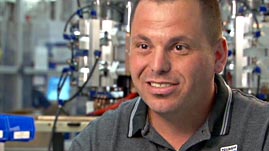Teachers' Domain - Digital Media for the Classroom and Professional Development
User: Preview

Source: College of Technology Regional Center for Next Generation Manufacturing (Connecticut Community Colleges)
In this video segment adapted from Connecticut's College of Technology/Regional Center for Next Generation Manufacturing, laser technician supervisor Dave DeGrand describes elements of his typical workday and the education needed to succeed in this cutting-edge field. Industrial laser manufacturing is a constantly changing industry. Teamwork is essential to success. Dave needs to communicate with people at all levels within the company, including engineers and the technicians he supervises. Daily team meetings help him understand the problems that occur. The ability to troubleshoot is also a valuable skill to ensure that operations run smoothly and customer deliveries are met.
Laser technicians work with scientists or engineers, serving a variety of functions. They may design, assemble, calibrate, test, operate, or repair lasers. Laser technicians may work in manufacturing, where their job is to cut, fuse, and engrave metals and nonmetals. Some laser technicians serve as field technicians, installing laser equipment or performing repair work at a customer site.
Precision laser technology is used in a range of industries, including defense, manufacturing, and health care. In the military, lasers are used in guidance systems for missiles and other ballistic projectiles. In manufacturing, laser technology offers a number of advantages over more traditional machining or shaping methods. For example, laser welding requires no filler material and creates welds that penetrate deeply with minimum distortion. Because no molds or other tools are required to make custom parts, laser processing results in accurate and repeatable production runs with quick turnaround times. Laser technology is also used in medicine for vision correction and cosmetic surgery procedures.
Maintaining and servicing lasers involves training in mechanics, electronics, and optics. Many career and technical educational centers, community colleges, and four-year universities offer degrees in laser technology. Programs are typically built around a general study of the applications and uses of laser technology, but also include courses in drafting and computer science. During their training, students spend a lot of time in the laboratory exploring optics, vacuum technology, electronics, instrumentation, and digital and solid-state circuit analysis. High school students interested in this field of study should take courses in electronics, advanced mathematics, and computer science.
Laser technician supervisors like Dave, who is featured in this video, manage multidisciplinary laser operations teams. Among their key responsibilities is facilitating communication between different organizational groups, such as the engineers and technicians, to ensure collaborative projects are completed. They also support the professional development and on-the-job training of staff. In addition to a background in engineering or science, supervisors must have extensive knowledge of health and safety regulations. Because they frequently need to manage under pressure and meet tight operational timelines, excellent time management and interpersonal communication skills are required to inspire teams to complete the work. Aspiring supervisors already working in the field may enroll in management courses through continuing education.
 Loading Standards
Loading Standards Teachers' Domain is proud to be a Pathways portal to the National Science Digital Library.
Teachers' Domain is proud to be a Pathways portal to the National Science Digital Library.
